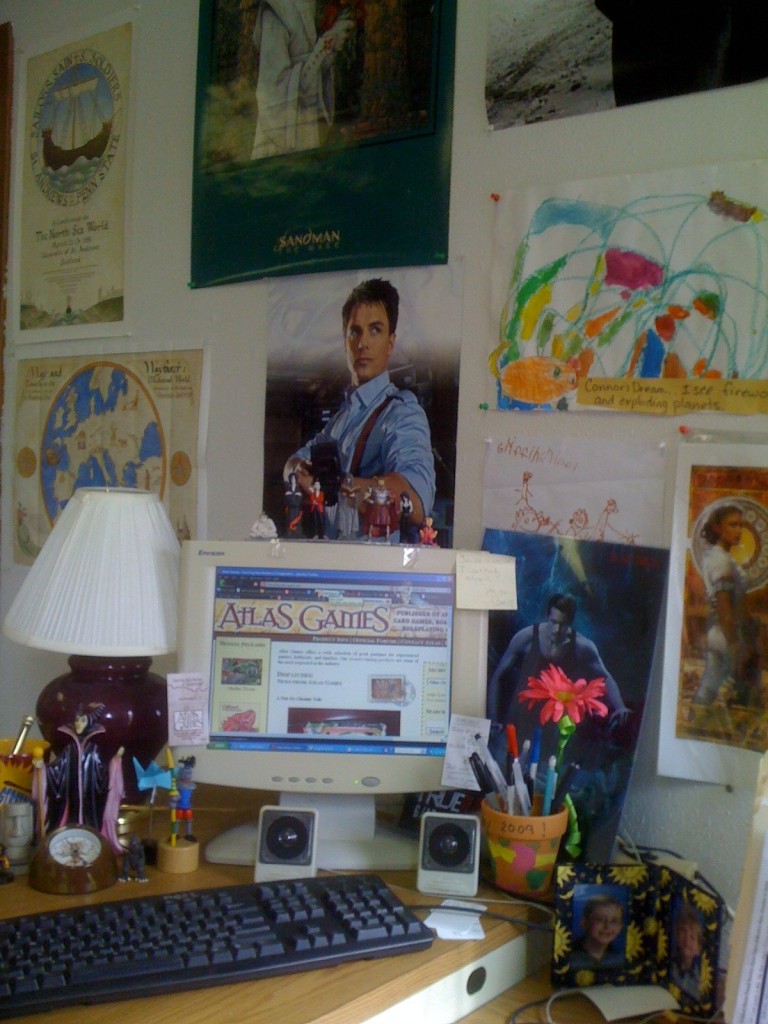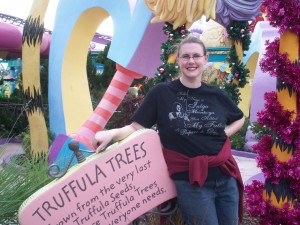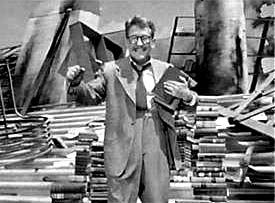 Game Theory, Literature
Game Theory, Literature  1 Comment
1 Comment Straight Into Hell: Reverb Gamers #9 & 10
REVERB GAMERS 2012, #9: Have you ever played a character of the opposite sex? Why or why not? If yes, how did the other players react? (Courtesy of Atlas Games.)
I can only think of two male characters that I created and played–I’m sure I’ve played male pregens at cons over the years, but they don’t stick in my memory so much. The first was the aforementioned Wasabi Delmonico, the San Francisco Kid. He was for a pulp one-shot, a Chinese-American teenager who raced soapbox derby carts down the Bay Area hills and did other sorts of wacky stunts. I think we fought flying gorilla men. His name is clearly the most memorable thing about him; his gender wasn’t really a factor in the game.
 The second male character I played was in a con game, but he’s lodged in my memory (and possibly those of other players) as firmly as any character in an extended campaign. My friends Lydia and Rob had raved about the fantastic sessions of Run Out the Guns! they’d played at Gen Con the year before, run by the game’s creator and historical-replica sailor Jason Hawkins. There’s a big focus on historicity and realism, for all that it’s a swashbuckling adventure game, so I didn’t want to introduce the anachronism of a female sailor, or deal with all the actual prejudice and liabilities that would come with portraying a woman accurately in the setting.
The second male character I played was in a con game, but he’s lodged in my memory (and possibly those of other players) as firmly as any character in an extended campaign. My friends Lydia and Rob had raved about the fantastic sessions of Run Out the Guns! they’d played at Gen Con the year before, run by the game’s creator and historical-replica sailor Jason Hawkins. There’s a big focus on historicity and realism, for all that it’s a swashbuckling adventure game, so I didn’t want to introduce the anachronism of a female sailor, or deal with all the actual prejudice and liabilities that would come with portraying a woman accurately in the setting.
So I made a bosun’s mate named Hamish Macbeth, a brawny ginger Scot. I was thoroughly immersed in the BBC series based on the M.C. Beaton books at the time, so sue me for unoriginality if you must. I’m a pretty fine vocal mimic, so that same immersion meant that I could affect a mighty strong (and fairly accurate, if I do say so myself) Highland accent. Jason was an amazing GM–his extensive work on the Rolemaster system meant he could handle the technical aspects with a facility not associated with Rolemaster, and his deep knowledge of the setting and ships meant he made very complex things run with a wild, fly-by-the-seat-of-your-pants, theatrical ease. The ship battles were epic, and it’s a bosun’s mate’s job to relay orders from the captain to the crew. I did this in a salty, broguey bellow that was, upon reflection, completely inconsiderate to every other game going on in the labyrinthine basement of Milwaukee’s Mecca Center. But, great good gods, did we have fun.
When the game was over, Jason shook my hand heartily and said, “Hamish, man, I’d follow you straight into hell with that voice!” I’ve shared that compliment often over the years, as one of the highlights of my game convention experience, but only upon thinking of my answer to this prompt did it occur to me that Jason and my fellow players referred to me and called for my attention all that night with male pronouns and epithets. I was so deeply into Hamish’s head that I honestly didn’t notice.
I’m not usually so thoroughly sunk in a character that I forget I’m not him/her, and the dissonance between my feminine self and a masculine character when I’m not completely in either world is the reason I don’t play male characters more often. I can’t possibly know what it’s like to be inside a man’s head, and I wouldn’t dare to suggest that I do, so I don’t trust myself to accurately portray a man’s motivations as I make decisions for that character. I think most game settings and GMs go out of their way to allow for greater gender balance than strictly historical mores would accommodate, so I haven’t felt restricted in my character choices by sticking with the gender I know.
REVERB GAMERS 2012, #10: Have you ever played a character originally from a book/TV/movie? How did the character change from the original as you played? If not, who would you most like to play? (Courtesy of Atlas Games.)
I’ve played a lot of great characters from book, TV, and movie settings I love, but for this prompt, all I can think about are the ones I despise. I’m going to bring some flak from earnest fans, but here’s the honest truth:
I HATE Sand from The Chronicles of Amber and Goldmoon from Dragonlance.
For those not familiar with these characters, here’s a bit of background. The Wikipedia entry for Sand and her brother Delwin, introduced in Blood of Amber, says this: “Delwin (brown & black) and Sand (pale tan & dark brown), twin brother and sister. They only lived a short time in Amber, preferring to live in the Shadow worlds and keep themselves removed from the affairs of their siblings.” I think it was the Diceless RPG by Erick Wujcik that introduced the idea that Sand has power over the dreams of others, but I’m not entirely certain of this. In any case, she’s a minor character, and she’s as flat and colorless as the substance for which she’s named.
 And I’ve never played Goldmoon in a run-through of the Dragonlance adventures that didn’t make me wonder why Goldmoon and Riverwind didn’t take their toy and go home. In one particularly memorable campaign, Goldmoon met the rest of the companions as they punched Flint repeatedly, in an effort to render him senseless so they could cross the river. I’ve got lots of problems with the character, but frankly, I’ve never been able to get past that first, most essential obstacle.
And I’ve never played Goldmoon in a run-through of the Dragonlance adventures that didn’t make me wonder why Goldmoon and Riverwind didn’t take their toy and go home. In one particularly memorable campaign, Goldmoon met the rest of the companions as they punched Flint repeatedly, in an effort to render him senseless so they could cross the river. I’ve got lots of problems with the character, but frankly, I’ve never been able to get past that first, most essential obstacle.
The cruelest thing my Darling Husband has ever done to me was to make me play Goldmoon in a Dragonlance one-shot while we were hanging out with friends in New Zealand. Halfway through the game, all the characters “woke up” to discover that they were actually Amberites, being manipulated through their dreams. And Goldmoon was actually Sand.
At which point, the words “divorce” and “green card” and “one-way ticket home” were casually thrown into the conversation.
Ironically, though Cam writes RPGs for licensed properties, I’ve only played Smallville once; I’ve never had the chance to play Serenity, Supernatural, Demon Hunters, Leverage, or Marvel Heroic Roleplaying. This isn’t because I wouldn’t love to. Rather, it’s a function of not being able to afford babysitters for game nights, and game conventions being work rather than play for us, on the rare occasions in the last decade when we can arrange someone to stay with the boys so I can attend. Hopefully, that’ll change, and I can finally find out what all the buzz is about.


